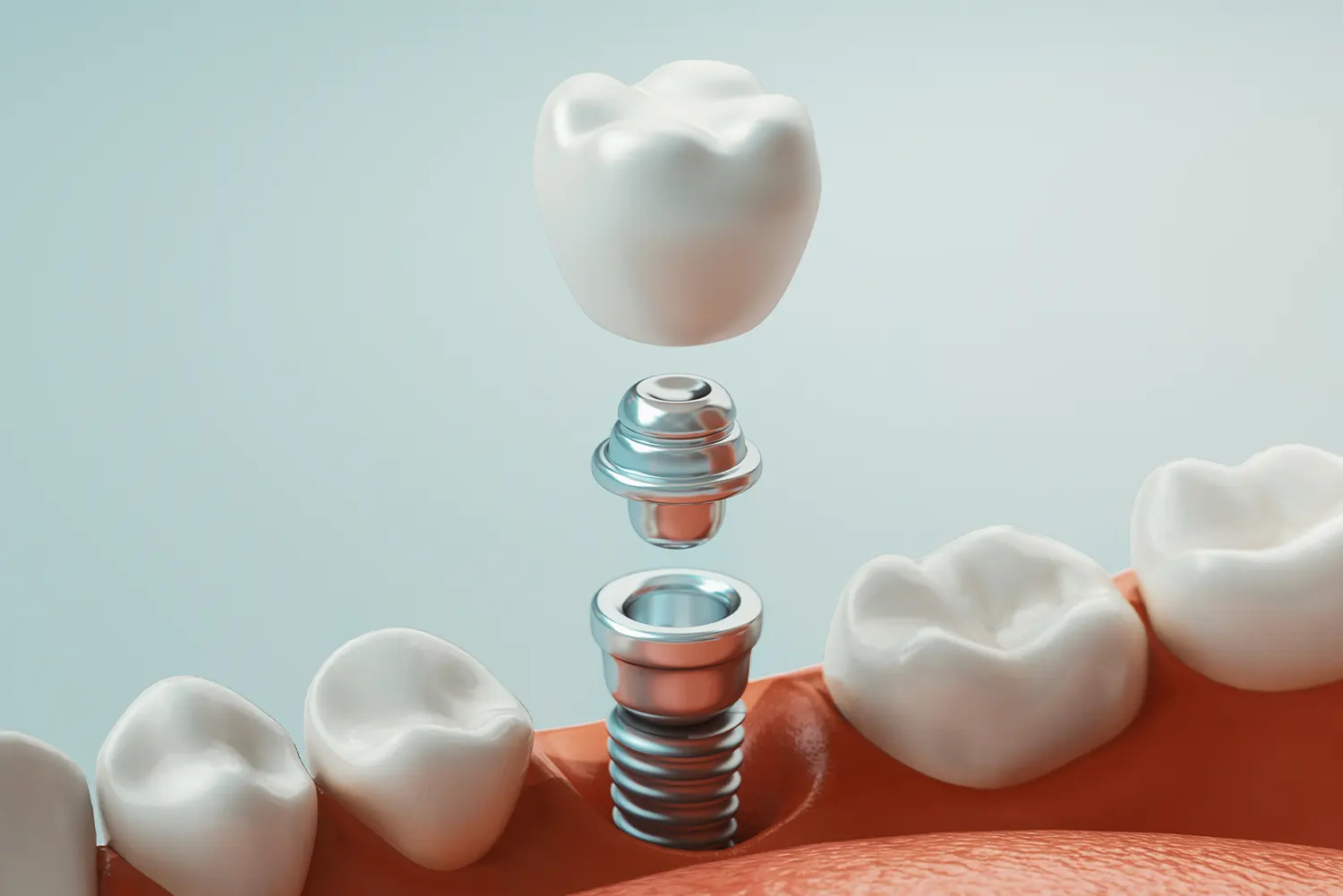
Dental Implants in McMinnville, Oregon
What Are Dental Implants?
Dental implant treatment is a restorative surgery that replaces missing or damaged teeth in either gum. The process involves drilling small titanium posts inside the jawbone or cheekbones. Abutments connect these implants to prosthetic teeth on top of them. Implants mimic the natural look and feel of your teeth and typically last for 20 to 30 years or more, depending on the type of implant.
The Dental Implant Process at All About Smiles Family Dentistry
Consultation and Treatment Plan

Implant Placement and Healing

Abutment and Prosthetic Tooth Placement
What are the Benefits of Dental Implants?
Look and Feel Like Your Natural Teeth
Dentists compare your teeth to a color chart to make prosthetic teeth that match the color of your actual teeth. The result is natural-looking restorations that blend with the rest of the teeth. No one will know you have dental implants unless you tell them.
Prevent Jawbone Deterioration
A lack of teeth can cause the rapid deterioration of the jawbone, leading to further tooth loss and a sunken appearance. Pressure from biting food with your teeth stimulates jawbone growth, while lack of it does the opposite. By replacing your missing teeth, implants can stimulate jaw bone growth and maintain your face’s youthful appearance.
Improves Speaking and Chewing Functionality
Pronouncing certain words and eating certain food is difficult with missing teeth. Implants are sturdy enough to withstand the pressure of biting into hard foods and provide a landing surface for your tongue, allowing proper, articulate speech.
Frequently-Asked Questions About Dental Implants
Your McMinnville dentist will determine your candidature for dental implants after conducting a few tests and taking X-rays of your teeth and gums. However, anyone with healthy gum (free from gum disease) can get dental implants. Patients with gum disease might require treatment prior to getting implants.
It’ll take about a week or two to resume your regular diet after getting implants. This is enough time for the gum tissue to heal. Once it stops being tender, you can eat whatever you like, but we advise chewing on the side without the implant. You’ll want to stick to soft foods and liquids until the gums heal.
Dental implants have a reputation for their durability and longevity. When properly cared for, dental implants can last a lifetime. The average lifespan of an implant is about 25 to 30 years, but this can vary depending on a number of factors including your overall health, oral hygiene habits, and regular dental check-ups. It’s important to note that while the implant itself can last a lifetime, the crown or prosthetic tooth attached to the implant may need replacement after 10 to 15 years due to normal wear and tear.
The process of getting dental implants involves a surgical procedure, so some discomfort is to be expected. However, most patients report that the discomfort is less than they anticipated. During the procedure, anesthesia is used to ensure the patient’s comfort. After the procedure, any pain or discomfort can typically be managed with over-the-counter pain relievers. It’s also common to experience some swelling and bruising in the days following the procedure. However, these symptoms usually subside within a week.
Dental implants have a high success rate and are considered a safe treatment option for tooth replacement. They are made from biocompatible materials, which means they are designed to work with your body without causing any harmful reactions. However, as with any surgical procedure, there are some risks involved. These can include infection, nerve damage, and sinus problems. It’s important to discuss these risks with your dentist before deciding on dental implants. Your dentist will also evaluate your overall health to determine if you are a good candidate for the procedure.
Dental implants are typically made from titanium, a strong and lightweight material that is also biocompatible. This means it’s not harmful to living tissue and can fuse with your jawbone through a process called osseointegration. This process, which can take several months, helps provide a stable foundation for the replacement tooth. The replacement tooth, or crown, is typically made from porcelain or ceramic materials to mimic the look and feel of a natural tooth. The crown is attached to the implant via an abutment, which is also typically made from titanium or ceramic materials.
Dental implants are a popular choice for tooth replacement due to their durability, longevity, and natural appearance. However, as with any medical procedure, it’s important to discuss your options with a healthcare professional. Dr. Frances Golly at All About Smiles in McMinnville, OR, is experienced in dental implant procedures and can help you make an informed decision based on your individual needs and circumstances.
